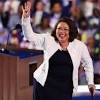Texas State released from contract to host debate, as Biden and ...

Sign up for the We the Texans newsletter to receive twice-monthly updates on our year-long initiative dedicated to boosting civic engagement and chronicling how democracy is experienced in Texas.
Any lingering hope that Texas would host a presidential debate this cycle was dashed Monday after the Commission on Presidential Debates released Texas State University from its contract.
The San Marcos campus was expected to host the first debate of the 2024 general election on Sept. 16 until President Joe Biden and former President Donald Trump sidestepped the commission, which has historically organized the forums, and brokered their own.
Biden and Trump are expected to debate for the first time Thursday. It will be hosted by CNN in Atlanta.
Lafayette College, Virginia State University and the University of Utah, Salt Lake City were also selected by the commission to host debates in the fall. Like Texas State, they were released from their contracts on Monday.
“It is unfair to ask the four campuses to continue to prepare for their debates, as they have been doing since their November 2023 selection,” commission co-chairs Antonia Hernández and Frank Fahrenkopf said in a statement. “We are grateful to the sites, and we are sorry to come to this decision. We are dismayed that students of the four campuses will not have the opportunity to participate in these historic voter education forums.”
Texas State would have been the first Texas university to host a presidential debate. Officials were expecting to spend about $5 million to host its debate and had appointed Jack Martin, a former chair of the Texas State University System’s Board of Regents, to lead fundraising.
The university said on Monday that it had immediately stopped planning and spending related to the debate when Biden and Trump announced their alternative plans last month.
“We remain steadfast in supporting our students and the entire university community as they continue to learn about democracy, to engage in civil discourse and to participate in the electoral process throughout the upcoming election cycle,” Texas State President Kelly Damphousse said in a statement on Monday, adding that the university had been excited to host the forum as the only Texas university to have graduated U.S. president and the only Hispanic-Serving Institution selected to host a debate.
While news organizations frequently host debates during the primary, the nonpartisan debate commission was established in 1987 to provide a neutral forum for candidates ahead of the general election.
The commission said in its statement that it would be ready to sponsor debates this election cycle “should circumstances change.”
“The reason for the CPD’s creation remains compelling: a neutral organization with no other role during the general election is well-positioned to offer formats that focus on the candidate and the issues that are most important to the American people,” Hernández and Fahrenkopf said.
In a letter to the commission last month, the Biden campaign said that the commission’s debate format was no longer up to date with contemporary voting trends, with debates scheduled to take place after early voting in many states has already begun. The campaign also said the commission failed to enforce its own rules during the 2020 debates.
Independent presidential candidate Robert F. Kennedy Jr. failed to qualify for this week’s debate in Georgia after falling short of criterion CNN set out requiring participants to have qualified for ballot spots in states that totaled at least 270 Electoral College votes — the minimum to win the White House.
Trump and Biden are also expected to debate Sept. 10.
Disclosure: Texas State University System has been a financial supporter of The Texas Tribune, a nonprofit, nonpartisan news organization that is funded in part by donations from members, foundations and corporate sponsors. Financial supporters play no role in the Tribune's journalism. Find a complete list of them here.
Voting FAQ: 2024 Elections
-
What other elections should I know about?
- Nov. 5 general elections for many state, federal and county offices. The voter registration deadline is Oct. 7.
-
Are there rules at the polls?
Cellphones, cameras, computers and other devices that can record sound or images cannot be used within 100 feet of voting stations (where ballots are marked). There are usually traffic cones or signs indicating this. Campaigning, including wearing clothing or other items that publicize candidates, political parties or measures on the ballot, is also banned beyond this point. Voters are allowed to use written notes to cast their ballot at the discretion of election officers, who may determine if the material counts as campaigning. Firearms, including handguns, are also prohibited at polling places, according to Texas law.
-
What are my rights as a voter?
Voters have the right to: - cast a provisional ballot if they are registered but their name does not appear on the list of registered voters because of an administrative issue - get written instructions about how to cast a ballot or to ask a polling place officer or worker (but not about who or what to vote for) - use up to two additional ballots to make corrections if a voter makes a mistake while marking their ballot - generally cast their ballots in secret and should not be subject to intimidation - get interpretation, assistance or accommodations to vote if they have a disability or limited English proficiency - vote during work hours without being penalized or losing pay (this may not apply if a worker has two hours before or after work to go vote) - cast their ballot as long as they’re in line by 7 p.m. on Election Day A state law passed in 2023 also allows voters with disabilities or mobility problems to skip the line at their polling location and requires each polling location to have a designated parking spot for curbside voting.
-
What if I was planning to vote in person, but I have been diagnosed with COVID-19 or get sick?
If you have contracted COVID-19 or are exhibiting symptoms, consider requesting an emergency early voting ballot or using curbside voting. Emergency ballot: These ballots can be requested if you become sick or disabled close to an election and are unable to go to a polling place on Election Day. To qualify, you must designate a representative to submit an application in person on your behalf and have a certified doctor’s note. The application must be received by your county’s early voting clerk before 5 p.m. on Election Day. Your ballot must be returned by the same designated representative before 7 p.m. on Election Day to be counted. Contact your county elections office for more details about an emergency early-voting ballot due to sickness or disability. Curbside voting: You can also contact your county elections office to determine if you’re eligible for curbside voting, which must be made available at every polling place for voters with disabilities unable to enter a polling location.
-
What can I do if I have trouble voting?
At the polls, voters can talk to election officers or poll workers if they run into issues. The secretary of state’s office has a helpline at 1-800-252-VOTE (8683) to reach state attorneys available to assist voters and election officials with questions. A coalition of voting rights groups runs voter protection hotlines in several languages. Disability Rights Texas also offers a helpline for people with disabilities.
- Read more

Just in: Former U.S. Rep. Liz Cheney, R-Wyoming; U.S. Sen. John Fetterman, D-Pennsylvania; and Oklahoma Gov. Kevin Stitt will take the stage at The Texas Tribune Festival, Sept. 5–7 in downtown Austin. Buy tickets today!


 United States
United States Argentina
Argentina  Australia
Australia  Austria
Austria  Brazil
Brazil  Canada
Canada  Chile
Chile  Czechia
Czechia  France
France  Germany
Germany  Greece
Greece  Italy
Italy  Mexico
Mexico  New Zealand
New Zealand  Nigeria
Nigeria  Norway
Norway  Poland
Poland  Portugal
Portugal  Sweden
Sweden  Switzerland
Switzerland  United Kingdom
United Kingdom 
























